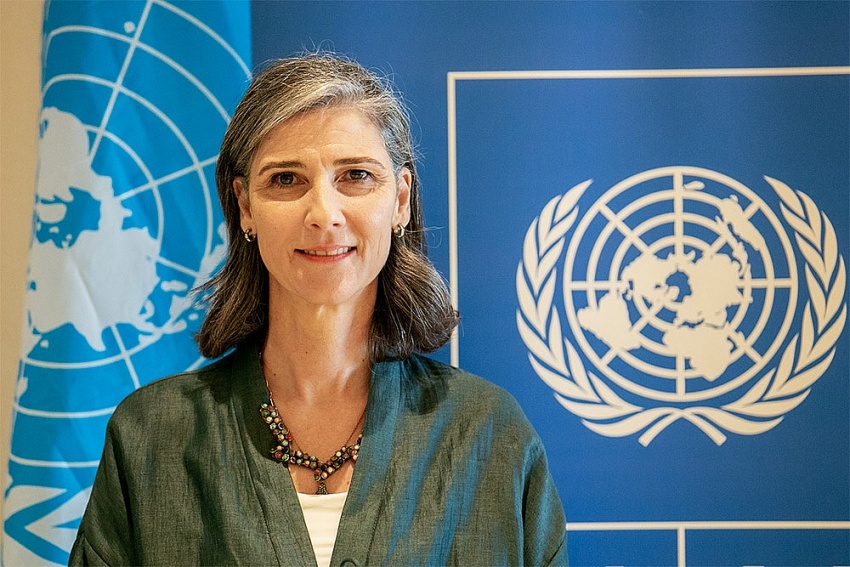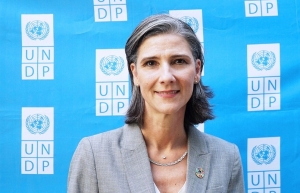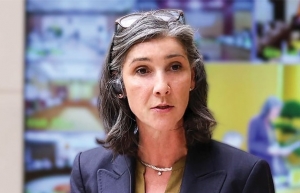Support exists for climate battle
The first global assessment of progress on climate action reaffirmed what we already knew: the world is lagging behind on its climate goals.
The assessment was presented to COP28 in Dubai at the end of last year. UN Secretary-General António Guterres raised the alarm in his remarks at the summit, warning that we are miles from the goals of the Paris Agreement – and minutes to midnight for the 1.5-degree limit.
As the dust settles on COP28, the world is left to reflect on the challenges laid bare, as well as the progress and strong commitments made during this pivotal gathering of global leaders. For Vietnam, a nation grappling with both the immediate and long-term impacts of climate change, the outcomes of COP28 carry profound implications that will help shape its trajectory towards a sustainable future.
 |
| Ramla Khalidi, resident representative in Vietnam of the United Nations Development Programme |
Adaptation and mitigation
We highlight four key areas. Firstly, parties defined time-bound targets and agreed a framework for the Global Goal on Adaptation, which aims to support vulnerable communities on the frontlines to build resilience and strengthen their adaptive capacity to the impacts of the climate crisis – a crisis they bear little responsibility for.
The summit also recognised that climate destruction often transcends the limits of adaptation, and requires innovative approaches to address loss and damage. That is why the operationalisation of the loss and damage fund was a landmark development designed to support developing nations, particularly those most vulnerable, such as Vietnam, to cope with catastrophic losses and costly damages incurred from the unavoidable impacts of climate change-induced disasters. The fund received initial commitments of just under $800 million.
Secondly, COP28 successfully overcame the deadlock in prior negotiations relating to the gap towards the 1.5-degree target. The summit concluded with a historic call to “transition away” from fossil fuels, signaling the beginning of the end of the fossil fuel era.
However, the outcome contains ambiguous language, making reference to “transitioning away from fossil fuels in energy systems,” compared to more ambitious calls for phasing out or phasing down fossil fuels.
At COP28, more than 130 countries endorsed a global renewables and energy efficiency pledge, committing to triple renewable energy and double the rate of energy efficiency improvement by 2030. Vietnam, despite its growing energy demand, bold international leadership in committing to a 2050 net-zero goal, and impressive national efforts to decarbonise its economy and transform its energy systems, is among the countries that have yet to endorse this pledge.
Vietnam did, however, join a group of 66 countries with the global pledge to reduce cooling-related emissions by 68 per cent by 2050 compared to 2022 levels.
Timely action
Thirdly, although large volumes of climate finance were pledged at COP28, including $57 billion in new commitments in the first four days alone, developed countries are coming up short of their current commitment to provide $100 billion annually in climate finance to developing nations. With developing countries’ needs estimated to be at least $6 trillion by 2030, we expect to see the adoption of a more ambitious climate finance goal at COP29.
The fourth aspect is that significant progress was made in terms of new commitments. These include 153 countries signing a declaration on sustainable agriculture, resilient food systems, and climate action. This aims to transform food systems to be more resilient and sustainable, reduce methane emissions, support gender-responsive transitions, protect people’s health from mounting climate impacts, and conserve nature.
Such agreements could not be timelier for Vietnam, given the country’s commitment to the implementation of its Just Energy Transition Partnership (JETP), agreed in December 2022. Under the JETP, international partners and leading financial institutions have committed to mobilise $15.5 billion over the next few years to catalyse Vietnam’s energy transition.
The JETP will support Vietnam with policy reform and development, technology transfer, investments in renewable energy development, improved energy efficiency, power grid upgrading and modernisation, skills development and capacity building for the transition, and increased private sector participation. It is expected to kickstart the shift away from fossil fuels and coal power, expedite the adoption of cleaner, renewable energy sources, and drive more foreign green investments into the country.
Among the most significant outcomes of COP28 for Vietnam was the successful launch of the JETP Resource Mobilisation Plan. The plan outlines a roadmap for Vietnam to mobilise the necessary financial resources and prioritise projects supporting its objectives. The effective implementation of JETP will support Vietnam to transform its economy to one that is green, low-carbon, and climate-resilient, while ensuring that the transition is just, equitable, and inclusive.
The commitments made during COP28, as well as Vietnam’s own path to a net-zero economy, present new development and business opportunities for the country, as well as prospects for increased regional and international collaboration in science, technology and innovation.
This was reaffirmed by Prime Minister Pham Minh Chinh, who had several bilateral meetings with global leaders and international companies at COP28 to garner support for investments in renewable energy and Vietnam’s green economy. The prime minister also committed to continue policy reform to create an improved enabling environment for investments.
Main proposals
To maximise these opportunities and support the flow of preferential climate finance and investments into the country to drive its development objectives, Vietnam should focus on priority areas identified by domestic and international investors.
Investors point to regulatory clarity and consistency as an important obstacle. In an environment of rapid change, overlapping and conflicting rules issued by central government agencies and local authorities generate uncertainty and complicate efforts of businesses to attract financing. The shortage of long-term, Vietnam dong-denominated financing remains a major constraint on domestic investors.
In the absence of deep and liquid secondary financial markets, the government must step in to create new mechanisms to ensure that financing is available for slow-gestating projects on reasonable terms.
Vietnamese businesses, including small- and medium-sized enterprises (SMEs), will have more opportunities to invest in new market segments and products, and participate in global supply chains. However, they require support. Technical help is needed, especially for SMEs, to enable them to compete in export markets and integrate into global supply chains.
Incentives must be developed for investments in energy efficiency, and we must find ways to improve their affordability. High upfront investment costs and limited funding for energy efficiency projects in Vietnam present challenges, particularly for SMEs. The cheapest energy is the one we don’t use, and so energy efficiency must remain a top national priority.
Above all, Vietnam’s energy transition must continue to aim for justice and equality for all; not only must the energy transition not bring about negative impacts on communities, but it should generate new opportunities and contribute to shared prosperity, especially for those that are most vulnerable.
The just transition must be people-centred, serving as a driver of new and improved employment opportunities, poverty eradication and social justice, so that no-one is left behind.
Climate change requires revitalised cooperation at the global level and solutions that span across borders. Along with his cautionary remarks, UN Secretary-General Guterres offered some hope that if collective, resolute action is taken, it is not too late. Only through concerted action can we create a greener, more prosperous and equitable future for all.
 Commitment proves Vietnam is serious on change Commitment proves Vietnam is serious on change |
 Catalysing change for all of society Catalysing change for all of society |
 The priority steps required for successful JETP mobilisation The priority steps required for successful JETP mobilisation |
What the stars mean:
★ Poor ★ ★ Promising ★★★ Good ★★★★ Very good ★★★★★ Exceptional
Related Contents
Latest News
More News
- Trung Nam-Sideros River consortium wins bid for LNG venture (January 30, 2026 | 11:16)
- Vietnam moves towards market-based fuel management with E10 rollout (January 30, 2026 | 11:10)
- Envision Energy, REE Group partner on 128MW wind projects (January 30, 2026 | 10:58)
- Vingroup consults on carbon credits for electric vehicle charging network (January 28, 2026 | 11:04)
- Bac Ai Pumped Storage Hydropower Plant to enter peak construction phase (January 27, 2026 | 08:00)
- ASEAN could scale up sustainable aviation fuel by 2050 (January 24, 2026 | 10:19)
- 64,000 hectares of sea allocated for offshore wind surveys (January 22, 2026 | 20:23)
- EVN secures financing for Quang Trach II LNG power plant (January 17, 2026 | 15:55)
- PC1 teams up with DENZAI on regional wind projects (January 16, 2026 | 21:18)
- Innovation and ESG practices drive green transition in the digital era (January 16, 2026 | 16:51)

 Tag:
Tag:
















 Mobile Version
Mobile Version